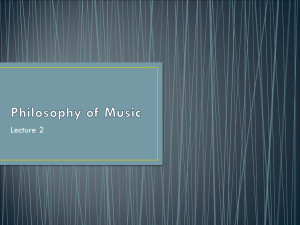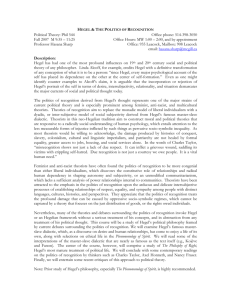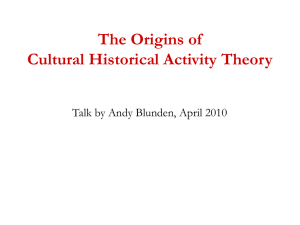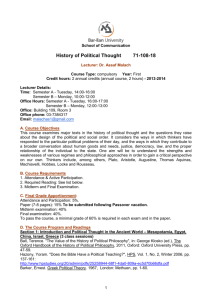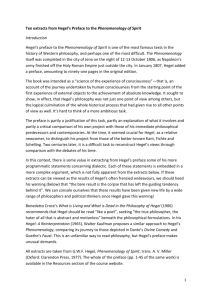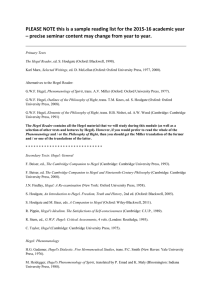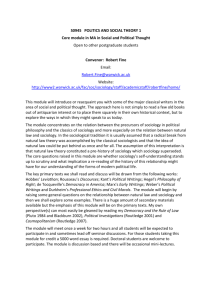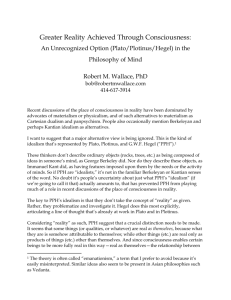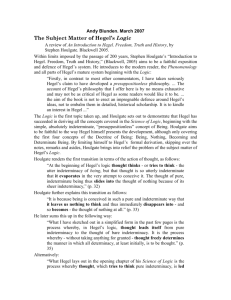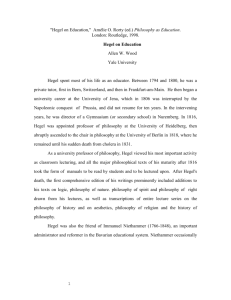Some of the reading will appear difficult although it contains some
advertisement
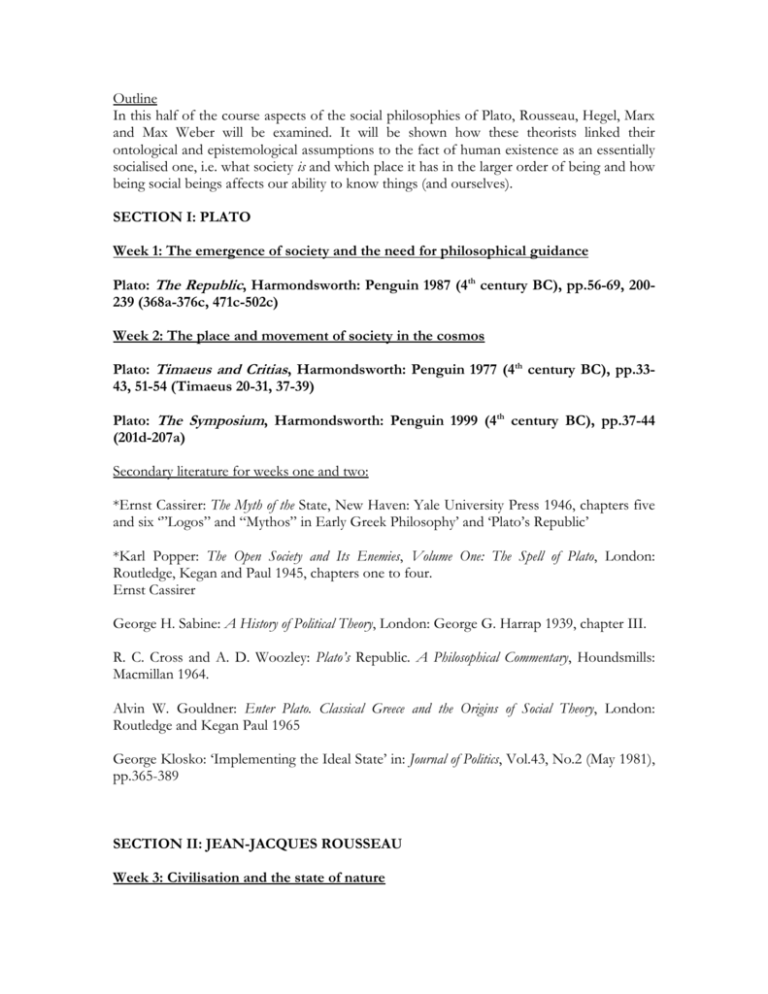
Outline In this half of the course aspects of the social philosophies of Plato, Rousseau, Hegel, Marx and Max Weber will be examined. It will be shown how these theorists linked their ontological and epistemological assumptions to the fact of human existence as an essentially socialised one, i.e. what society is and which place it has in the larger order of being and how being social beings affects our ability to know things (and ourselves). SECTION I: PLATO Week 1: The emergence of society and the need for philosophical guidance Plato: The Republic, Harmondsworth: Penguin 1987 (4th century BC), pp.56-69, 200239 (368a-376c, 471c-502c) Week 2: The place and movement of society in the cosmos Plato: Timaeus and Critias, Harmondsworth: Penguin 1977 (4th century BC), pp.3343, 51-54 (Timaeus 20-31, 37-39) Plato: The Symposium, Harmondsworth: Penguin 1999 (4th century BC), pp.37-44 (201d-207a) Secondary literature for weeks one and two: *Ernst Cassirer: The Myth of the State, New Haven: Yale University Press 1946, chapters five and six ‘”Logos” and “Mythos” in Early Greek Philosophy’ and ‘Plato’s Republic’ *Karl Popper: The Open Society and Its Enemies, Volume One: The Spell of Plato, London: Routledge, Kegan and Paul 1945, chapters one to four. Ernst Cassirer George H. Sabine: A History of Political Theory, London: George G. Harrap 1939, chapter III. R. C. Cross and A. D. Woozley: Plato’s Republic. A Philosophical Commentary, Houndsmills: Macmillan 1964. Alvin W. Gouldner: Enter Plato. Classical Greece and the Origins of Social Theory, London: Routledge and Kegan Paul 1965 George Klosko: ‘Implementing the Ideal State’ in: Journal of Politics, Vol.43, No.2 (May 1981), pp.365-389 SECTION II: JEAN-JACQUES ROUSSEAU Week 3: Civilisation and the state of nature Jean-Jacques Rousseau: The Social Contract and Discourses, London: Everyman 1993, pp.3-8, 15-17 (from the ‘Discourse on the Arts and Sciences’ 1750), pp.43-45, 4953, 59-64, 70-76, 80-83 (from the ‘Discourse on the Origin of Inequality’ 1755) Week 4: The origin of inequality and its remedy Jean-Jacques Rousseau: The Social Contract and Discourses, London: Everyman 1993, pp.83-99 (from the ‘Discourse on the Origin of Inequality’ 1755), pp.190-199 (from the ‘Social Contract’ 1762) *Leo Strauss: Natural Right and History, Chicago: University of Chicago Press 1953, chapter VI.B. ‘Rousseau’ SECTION III: G. W. F. HEGEL Week 5: Lordship and Bondage G. W. F. Hegel: Phenomenology of the Spirit, Oxford: Oxford University Press 1977 (1807), pp.9-13, 108-119 (paragraphs 17-22 from the ‘Preface’ and paragraphs 172-196 from ‘Self-Consciousness’) *Alexandre Kojève: Introduction to the Reading of Hegel, New York: Basic Books 1969, chapter 2 ‘Summary of the First Six Chapters of the Phenomenology of the Spirit’ *George Armstrong Kelly: ‘Notes on Hegel’s “Lordship and Bondage”’, in: Review of Metaphysics Vol.19 (1965). Charles Taylor: Hegel, Cambridge: Cambridge University Press 1975, chapters four and five ‘The Dialectic of Consciousness’ and ‘Self-Consciousness’. Herbert Marcuse: Reason and Revolution. Hegel and the Rise of Social Theory, London: Routledge and Kegan Paul 1963, chapter IV ‘The Phenomenology of the Mind’ Georg Lukács: The Young Hegel. Studies in the Relations between Dialectics and Economics, London: Merlin 1975, Part 4, chapter 4 ‘”Entäusserung” (“externalization”) as the central philosophical concept in The Phenomenology of the Mind’ Week 6: Reading week Week 7: Family and civil society G. W. F. Hegel: Philosophy of Right, London: Oxford University Press 1957 (1821), pp.110-113, 117-119, 122-129 (paragraphs 158-164, 173-177, 181 from ‘The Family’ and 182-198 from ‘Civil Society’) Michael O. Hardimon: Hegel’s Social Philosophy. The Project of Reconciliation, Cambridge: Cambridge University Press 1994, chapter 6 ‘The Family, Civil Society, and the State’ Merold Westphal: ‘Hegel’s Radical Idealism: Family and State as Ethical Communities’, in: Z. A. Pelczynski (Ed.): The State and Civil Society. Studies in Hegel’s Political Philosophy, Cambridge: Cambridge University Press 1984, pp.77-92 Garbis Kortian: ‘Subjectivity and Civil Society’ in in: Z. A. Pelczynski (Ed.): The State and Civil Society. Studies in Hegel’s Political Philosophy, Cambridge: Cambridge University Press 1984, pp.197-210 SECTION IV: KARL MARX Week 8-9: The production of life, historic materialism and ideology Karl Marx and Frederick Engels: The German Ideology, Moscow: Progress 1968 (1845/6), pp.31-65, 78-87 (from ‘Feuerbach’) Anthony Giddens: Capitalism & Modern Social Theory, Cambridge: Cambridge University Press 1971, part 1 ‘Marx’, esp. chapter 2 ‘Historic materialism’ Lucien Sève: Man in Marxist Theory, Sussex: Harvester Press 1978, chapter ‘The Conception of Man from The German Ideology to Capital. Henri Lefebvre: The Sociology of Marx, London: Allen Lane 1968, chapters 2 and 3 ‘The Marxian Concept of Praxis’ and ‘Ideology and the Sociology of Knowledge’ SECTION V: MAX WEBER Week 10: Basic concepts of the social Max Weber: Economy and Society, Berkeley: University of California Press 1978 (1922), pp. 4-42 (from the ‘Conceptual Exposition’) Alfred Schütz: The Phenomenology of the Social World, Evanston: Northwestern University Press 1967, chapter 1 ‘The Statement of Our Problem: Max Weber’s Basic Methodological Concepts’ Lucien Freund: The Sociology of Max Weber, London: Allen Lane 1968, chapters 1-3 Week 11: Unintended and uncontrolled rationalisation Max Weber: The Protestant Ethic and the Spirit of Capitalism, London: Routledge 1992 (1904/5) 47-63, 102-106, 156-163, 156-163 Maurice Merleau-Ponty: Adventures of the Dialectic, Evanston: Northwestern University Press 1973, chapter 1 ‘The Crisis of Understanding’ Gordon Marshall: In Search of the Spirit of Capitalism. An Essay on Max Weber’s Protestant Ethic Thesis, London: Hutchinson 1982, esp. chapters 3 and 4. Questions Nietzsche says in Discuss parallels and differences between Plato’s form of the good society and Weber’s ideal-typical reconstruction.




